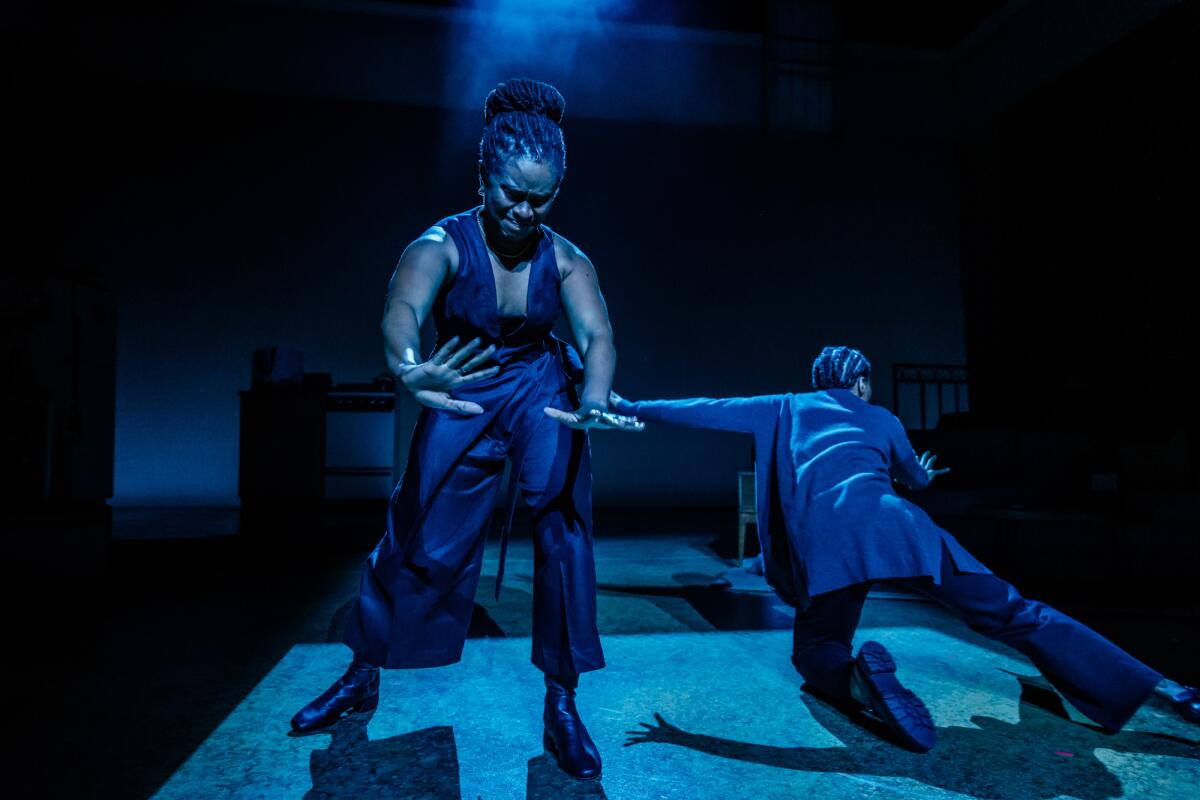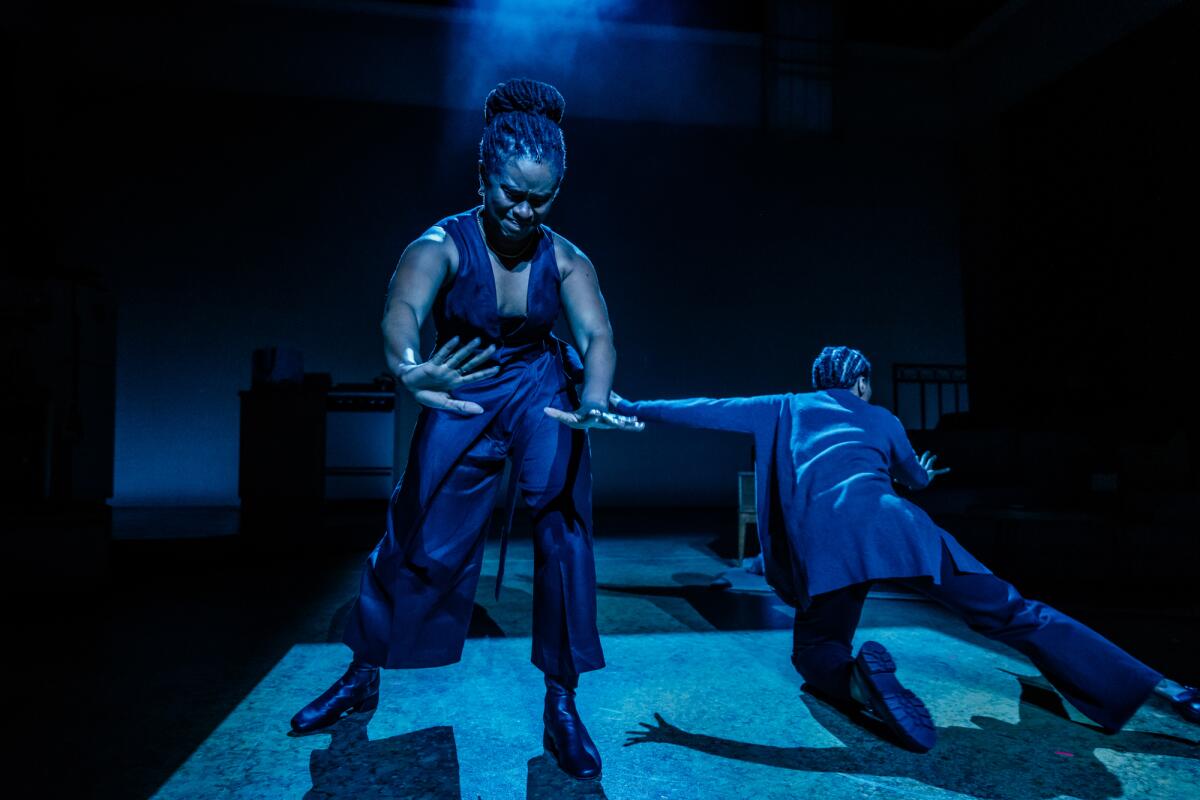Playwright a.k. payne, who studied under Geffen Playhouse Artistic Director Tarell Alvin McCraney at Yale, chooses not to capitalize their name. They (note the choice of pronoun) don’t wish to have their identity determined by suspect structures.
This biographical information is pertinent to payne’s “Furlough’s Paradise,” which won the 2025 Susan Smith Blackburn Prize and is now having its West Coast premiere at the Geffen Playhouse. The play, a two-hander directed by Tinashe Kajese-Bolden, concerns two bracingly intelligent Black cousins who grew up together but whose lives have diverged.
On the surface, not much connects these characters, but surfaces can mislead. Once as close as siblings, these cousins are trying in their different ways to imagine a world that will allow them to discover themselves outside of inherited assumptions and oppressive hierarchies.
Mina (Kacie Rogers), a graduate of an Ivy League school, works for Google and lives with her white girlfriend, Chelsea, in Los Angeles. Sade (DeWanda Wise), whose name is pronounced shah-day, like the singer, has been granted a weekend furlough from prison to attend the funeral of her mother.
They have not seen each since Sade was sent to jail. Mina’s father died during this period, and she now keeps a small apartment in her hometown, a kind of safe house that allows her to commune with her past and escape from the endless striving of California. (The location is unnamed but described in the program as a U.S. Great Migration city in late 2017, so perhaps Pittsburgh, where the playwright has roots.)
The death of Sade’s mother, the twin of Mina’s father, is an occasion for a double mourning. But it’s also an opportunity for a double rebirth. Mina and Sade are witnesses not only to each other but also to the conditions that formed and deformed their dreams.
“Furlough’s Paradise” is a small play that expands outward to the social and metaphysical worlds, not unlike McCraney’s “The Brothers Size,” a palpable influence.
Projection designers Yee Eun Nam and Elizabeth Barrett create a kaleidoscopic background on Chika Shimizu’s pied-à-terre set. With help from Pablo Santiago’s lighting and Cricket S. Myers’ sound design, the production magnifies in cinematic fashion the inner lives of the characters.
This lyrical drama, choreographed by Dell Howlett, floats at times like a movement-theater piece reaching for the heavens. The acting is grounded in realism but the writing refuses to keep the characters under lock and key. Life may have thrown up walls but nothing can block their yearning.
What does liberty mean and how can it be lived in an unfree world? (The word “liberty” is projected onto the set along with other thematically relevant vocabulary at the start of the play.)
Mina shares her dream of raising children outside of the fixed binaries of gender. Sade reveals the utopia she and her girlfriend, along with other fellow inmates, have been imagining, a collective portrait of a peaceful haven for “free formerly incarcerated Black girls.”
The cousins are content to spend the weekend holed up with each other, sorting through the past and measuring the distance between them. Costume designer Celeste Jennings illustrates their differences through clothing choices that reflect Sade’s more marginalized status and Mina’s more assimilated reality.

Kacie Rogers, left, and DeWanda Wise in “Furlough’s Paradise” at Geffen Playhouse.
(Jeff Lorch)
Mina is surprised that Sade isn’t more eager to exploit her weekend out of jail, but Sade relishes the freedom to just be. Accustomed to not having options, she’s perhaps better able to appreciate the quiet togetherness of being holed up in her cousin’s apartment.
They watch TV and movies, eat cereal, play music and resurrect the cast of characters from their youth. August Wilson made it his mission to put the rituals of Black life onstage, to give representation to the daily customs of a people who had been denied visibility in mainstream culture.
Payne follows suit, though the references in “Furlough’s Paradise” are largely from pop culture (“The Fresh Prince of Bel Air,” “The Proud Family” and “The Cheetah Girls”) and the name-checking can sometimes seem slightly pandering, a playwright pushing easy buttons. But the play digs deep into the challenge of shaping a life into something that doesn’t feel like a betrayal.
Mina resents when Sade harps on the inequities of their childhoods. She thinks her cousin is making excuses for some bad choices.
But Sade reminds Mina that small differences in parental belief and imagination can make a world of difference. Mina’s father flouted strictures; Sade’s mother subjugated herself to them — that is, until Sade went to jail on a serious felony and compassion for her daughter awakened her long-dormant maternal loyalty.
“Furlough’s Paradise” makes the case that character isn’t defined by elite education or criminal record. (The exact nature of Sade’s crime goes unstated.) Our identities are a complicated calculus of opportunity and challenge. If being alone is the eternal problem, as Sade and Mina seem to acknowledge, love, in all its gnarly reality, is the only way to be truly seen.
The kinetic staging, while keeping the action from becoming claustrophobic, sometimes oversteps the mark. The skips in time that occur in the play are unnecessarily italicized. The choreography is refreshing but might be more so with a little more restraint. What distinguishes payne as a rising talent is the breadth of human understanding that makes the characters of “Furlough’s Paradise” seem like old friends by the end of the drama.
Rogers’ Mina and Wise’s Sade are so singularly and contrastingly themselves that it’s not clear how they will ever reconcile their versions of the past. But this reunion catalyzes their desire to connect the dots that constitute their parallel lives.
“Furlough’s Paradise” makes you care deeply about what will happen to Mina and Sade once the authorities come to collect Sade. I left the theater wishing not only the playwright a safe journey but also the play’s characters.
‘Furlough’s Paradise’
Where: Gil Cates Theater at Geffen Playhouse, 10886 Le Conte Ave., L.A.
When: 8 p.m. Wednesdays-Fridays, 3 and 8 p.m. Saturdays, 2 and 7 p.m. Sundays. Ends May 18
Tickets: $45-$139 (subject to change)
Contact: (310) 208-2028 or www.geffenplayhouse.org
Running time: 1 hour, 20 minutes (no intermission)
